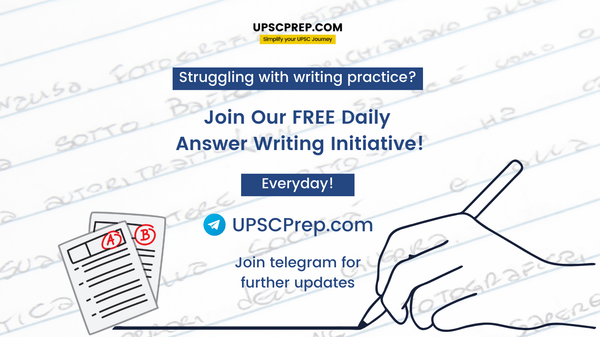Subject: GS 4
Syllabus: Emotional Intelligence + Contributions of Moral Thinkers and Philosophers
Questions
- In higher levels of organisation, it is emotional intelligence which is required more than intellectual intelligence. Substantiate the statement. Highlight how to develop emotional intelligence? (150 Words, 10 Marks)
- Write short notes on the following in 30 words each :
(150 Words, 2 x 5 = 10 Marks)- Conscience as a source of ethical guidance - M. K. Gandhi
- J. S. Mill and his contribution in Ethics.
Model Structure
In higher levels of organisation, it is emotional intelligence which is required more than intellectual intelligence. Substantiate the statement. Highlight how to develop emotional intelligence? (150 Words, 10 Marks)
Model structure
Introduction
- Emotional intelligence is the ability of a person to control and regulate their own emotions by being aware of them, which helps them to understand the emotions of others.
Main body
- Emotional intelligence has the following characteristics-
- Self-regulation - knowing your own weakness and strength helps control and manage them for positive output.
- Self-awareness - a state of awareness of one's own mindset and ability to handle them positively.
- Motivation - even in face of adversity when everything is going against you, self-motivation is key to handle self and others.
- Empathy - means the ability to keep oneself in others' shoes and understand what they are going through. It helps bring a situation driven approach and take action accordingly.
- Social skills - point of views can be expressed cordially and antagonistically. While the former helps build relationships, the other causes deterioration of ties.
- To achieve success, one has to be predictive or consistent in actions. This can be achieved by developing emotional intelligence by-
- Non verbal understanding- It helps recognise and understand others feelings and emotions without formal communication.
- Meditation - helps build focus, determination and self realization.
- Developing empathy and compassion - by knowing what another person is going through, one can take action to alleviate the suffering.
- Introspection- It means flushing out negative thoughts and ideas, and building upon positive ones.
Conclusion
- The answer lies within and one should take responsibility for any mishappening or negative thoughts/outcomes, rather than blaming others. This is the starting point of developing emotional intelligence.
- Write short notes on the following: (150 Words, 2 x 5 = 10 Marks)
(i) Conscience as a source of ethical guidance - M. K. Gandhi.
Gandhi Ji famously said, “There is a higher court than courts of justice and that is the court of conscience. It supersedes all other courts.” Conscience is the voice in our head and the feeling in our heart that tells us if something is right or wrong. Conscience acts within human beings and checks the morality of human actions.
- For example, a person who was charged less than the actual amount by a shopkeeper might return the spare amount due to their conscience.
- For example, Sachin Tendulkar, knowing that he is out, walked out even though the umpire had not given him out.
(ii) J. S. Mill and his contribution in Ethics.
John Stuart Mill was a political thinker and an activist of the 19th century in Britain.
He was one of the foremost believers in and practitioners of Utilitarianism, a system of thought that essentially declared an action to be proper if it was beneficial to the largest portion of society.
In his essay, On Liberty, he is adamant that preserving individual liberty rests largely on protecting freedom of thought no matter how egregious or immoral and, by extension, the freedom to express oneself based on that thought.

Mains Focus Group + Write Unlimited (for Mains 2025)
One Stop Solution for UPSC Mains 2025
